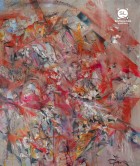Here is an orienting question: In 10 words or less, what are your “writerly interests”?
Shame, trauma, mental illness, being unnatural while being of nature.
Personally, I’m most drawn to flash fiction that, like “Flush,” emphasizes language over the conventions of quote unquote plot. I guess I feel that flash allows for, even encourages, a different kind of storytelling than your classic rising/falling action. The revelations can be packaged differently. Do you have any thoughts on this one way or another, whether about “Flush” or the short form generally?
I’ve always had this weird relationship with writing where I love writing poetry more than fiction, but love reading fiction more than poetry. In a way, flash fiction feels like it can scratch both itches. Part of poetry’s power is the ability to say a hell of a lot in not very many words, relying on their texture, their felt meaning rather than their literal meaning. A longer story can be meticulously structured, sentence by sentence, with its power often lying in what happens and what the writer chooses to say about what’s going on in their characters’ minds. Obviously, structure is vital in poetry, as word choice is in fiction, but if I had to define the difference between the genres that’s more or less how I’d do it. In a flash piece, you don’t necessarily have the time or space to construct a complex, multi-layered plot (though I’ve certainly seen it done!), so you get to weave the more implicit persuasion of poetry into the explicit telling of a plot or a character.
“Flush” stood out to me because of the strength of its voice. So many interesting things happen in the first two sentences alone: the in medias res beginning, the gigantic second sentence, the phrases repeated like a mantra or a prayer or a curse. My first thought: “Oh, this is an interior monologue.” But the story is more than that—it observes as much as it ruminates. My understanding kept shifting as I read, which I think is one of the piece’s biggest strengths. Would you say it is “about” something specific, or do you see it as talking around and wrestling with many things, and that’s what it is about?
I wrote the first draft of “Flush” over seven years ago, and at the time I would have said it’s about whether or not god truly loves a drunk. I started looking at it again two years ago, and I think what inspired me to give it another round of edits was the joyful nihilism: how fun life is when nothing matters. It’s the kind of fun you can only have when you’ve opted out of some (or all) of life’s social calls—because you’re mentally ill, or an addict, or you’re oppressed or invisible, or you’re chronically broke, whatever. You still get to participate in being there, seeing everything, having thoughts and opinions about it, but then you also get to leave it behind at your leisure. Maybe it’s “about” that, but I also don’t think that writers are the best judges of what their pieces are about.
“Joyful nihilism,” I love that. There is a real kind of bleak humor here—but there’s also stark shifts into killer moments like “all there is out the window is the big hopeless with the life you laid out before you” which are, you know, both clear-eyed and very somber. Can you talk about how you approach humor in your fiction, and maybe more specifically, how you balance it with heartbreak?
I never think anything I write is funny, and I’m always surprised when people say they laughed or found it amusing. If I tried to write something funny on purpose, it would probably be a disaster. But I’ve always loved dark comedy, so it must have just rubbed off. I love a good surprise, and sometimes the best surprise is a joke in a dark place or vice versa. For me, humor and heartbreak work in tandem: The humor disarms you, and then the heavy stuff comes in for the kill. In real life, I try to have a sense of humor about my darkness, my traumas, and I pull from that when I write.
A last question I like to ask: what are you reading right now? Books or work in journals or whatever. What’s grabbing you, what’s inspiring you?
I’ve gotten really into creative nonfiction recently, both writing and reading. I just finished Animals Strike Curious Poses by Elena Passarello and that book messed me up in the best way. That’s the book I wanted to write! She’s so smart. I started reading The Empathy Exams by Leslie Jamison and whoah—she writes so deftly about extremely complicated and messy emotions. I love all the formal creativity and rule-breaking in contemporary creative nonfiction. It’s exciting!


